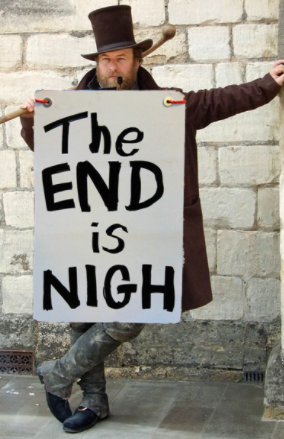Chapter 15: The end is nighA Story by HelenA sample chapter from my short fiction book (My name is Helen and I am)
The year was 1988, and few remembered Dark Lord Pompadour, but his hold on the land was still strong. Most people still believed in his legacy, in the proper order of things, in the inevitability of power and money as deciding factors for a person's station in life, and in the dominance of a system that saw enlightenment only as book learning, and which placed money making, and the pursuit of pleasure above all else. No-one remembered the time before Lord Pompadour, when there was a more natural and softer order, when respect and reverence for the land and the elements were passed down from generation to generation, and these were considered to be the most sacred forms of knowledge of all. Lord Pompadour had done his work well, and had embedded his values into the hearts of the people. Yes, hardship and injustice were plain to see, and economic times were harsh, but on the whole, everyone believed that this was still a time of progress. From time to time, the collective wisdom was challenged, and people thought that their democratic rulers had provided them with a voice. No-one believed the man in the capital city, who donned his sandwich board each Sunday morning, declaring to the world that “the end is nigh!” The year was 1988, and Helen was slowly and painfully beginning to learn that life does not always work as you wish, no matter how hard you wish for it, or how hard you try. Still seeking desperately to fill her gaping wounds, she had married young, to another abandoned child, and her belly was filled with a baby of her own. When she was seven months pregnant, her young husband left her for a woman who seemed to have more to offer, and again Helen felt the agony of being left all alone. The birth of her daughter gave her a sense of purpose, but lacking her own mothering, Helen was blissfully unaware of how ill-equipped she was to care for this new and precious being. Helen’s desire to love and be loved was squandered again and again, due to her lack of resources. She had nothing to draw on, just a big old gaping hole, that screamed to be filled. And so the resulting chaos was inevitable. Arguments and violence, neglected children, an inability to love or to nurture, in spite of good intentions. The stories that Leana had witnessed in the healing place under the Mighty Oak now told themselves in Helen’s life. Another marriage. Another precious, but destined-to-be-neglected child. A move to a different town. And back again. Drunkenness. Divorce. A period of aloneness. A period of education. A new relationship. A new house. A new job. And nothing new; everything the same. The year was 1988, and a young man named Michael was leaving the land of his birth, with his wife and their three small children. He might have told you that he was seeking a better life for himself and his family, but in truth he was running away, and holding his wife and children hostage in the process. He might have told you that he loved them very much, for indeed he did, but Michael was a prisoner himself, chained by addiction to a life that was destined for tragedy. And Michael’s desires to stand on his own two feet, to claim his independence, and to be a strong and loving father and husband were squandered too, for he had also been raised in the shadow of dark Lord Pompadour, and he had encountered too much violence, and suffered too many violations, at too young an age. The year was 1988, and it was inevitable, in the years near to the end of Lord Pompadour’s dark reign, that there would be some turbulence, chaos and upheaval. For it is always so, in times of great change. Some of the upheaval appeared on the outside, and took the form of political crises, injustices, wars, terrorism and environmental degradation. Indeed, these symptoms, and more, were rife at the end of Lord Pompadour’s rule, which played out during the course of Helen's adult years. But these happenings were as much distractions as the attempts by the humanitarians and the environmentalists to fix the world, to find solutions, to protest and to challenge, and to join the marches and the movements, to pledge support and, later, to #metoo. Helen was tempted by these distractions. She was passionate about justice, had fought some causes in her time. Her heart wept for the underdog, and she did qualify to #metoo. Not for her the mainstream desire to pledge solidarity with Charlie Hebdo. “Je suis Ahmed” she thought, “or maybe even “Je suis Saïd” or “Je suis Chérif”, if there were such things. After all, aren't we all the same underneath, equally capable of good and bad?” Mostly, however, the upheaval was internal, and Helen felt as if she was hurtling towards madness, towards her own death and destruction, as her scarce resources dwindled further under the relentless lash of alcoholism. She held on with white knuckles for some time, picking herself up time and again, still believing she could manage. It was not for many years, and until she finally fell to her knees in brokenness, that Providence was able to show her the way. © 2021 HelenReviews
|
Stats
100 Views
3 Reviews Added on January 31, 2021 Last Updated on January 31, 2021 AuthorHelenLuton, Bedfordshire, United KingdomAboutWhen I joined WritersCafe, I originally posted the poems I had written as part of my personal healing journey - childhood trauma to alcoholism to recovery. I wasn't sure if my writing would be of inte.. more..Writing
|


 Flag Writing
Flag Writing